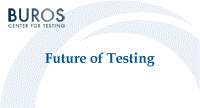Buros-Nebraska Series on Measurement and Testing

The Future of Testing
Date of this Version
1986
Document Type
Article
Citation
Published in The Future of Testing, edited by Barbara S. Plake & Joseph C. Witt (Hillsdale, NJ: Lawrence Erlbaum Associates, 1986).
Abstract
Dewey (1917) has encouraged us to nourish and advance our science in two ways. In the most typical way, knowledge advances in an additive sense whereby new information (usually data) is added to what is already known in an existing area of inquiry. A second, less common but nonetheless important method demands qualitative rather than quantitative change in the way we think about problems and the addition of knowledge. In other words, these two alternatives can be summed up by considering the first as looking for new answers to old questions and the second as looking for ways to ask new questions. This book is concerned with both of these approaches of considering the future of testing and measurement.
When a field or endeavor is really understood, it is possible for our future actions to be governed by a knowledge which forces us beyond preconception into a new or renewed awareness of the largeness of possibility (Berry, 1983). Dewey put the notion this way:
A being which can use given and finished facts as signs of things to come, which can take given things as evidence of absent things, can, in that degree, forecast the future; it can form reasonable expectations. It is capable of achieving ideas; it is possessed of intelligence. For use of the given or finished to anticipate the consequence of processes going on is precisely what is meant by ' ideas,' by ' intelligence.' (Dewey, 1917, p. 21)
Without an overall plan of the desired directions for the future, development and advancement would be relegated to a haphazard status. Such a status is incompatible with the goals of science. Thus, even though advancement may be still possible, an overriding plan is not known or considered by the persons in the positions to be concerned with and potentially responsible for the research and intellectual efforts needed to achieve these advancements and directions. Development and advancement of a field is not so much the desired outcome of research and effort as the concentration of the activities or research and effort to identified goals and objectives. Advancement by goals and objectives requires a focus not only on the current status of the field, but also of the needed directions for the field. Also, by considering the probable directions of the field, undesirable but likely outcomes might be identified. It may then be possible to devise a plan to change the present path and thereby avoid or diminish the impact of this undesirable outcome. Therefore, preparation and preplanning by conscious effort may, in fact, alter the directions of the future.
Authors of the chapters which follow were charged with two tasks. First, to summarize the present state of their respective fields in an additive sense and then to use this information to make informed predictions. In doing this analysis many of the authors also identified new questions which heretofore had not been asked.
The overriding purpose of this volume of the Buros-Nebraska Series on Measurement and Testing is to provide a vision of what may be probable directions for the field of measurement and testing. Through the collection of chapters which address a variety of dimensions of the future of testing, it is possible to identify areas of present concern and to identify potentially important areas for dedication of energies in the future.


Comments
Copyright © 1986 by Lawrence Erlbaum Associates. Digital edition copyright © 2012 Buros Center for Testing. This book may be downloaded, saved, and printed by an individual for their own use. No part of this book may be re-published, re-posted, or redistributed without written permission of the holder of copyright.